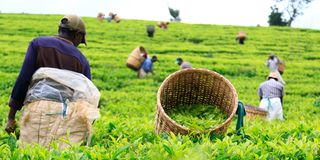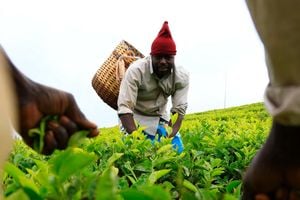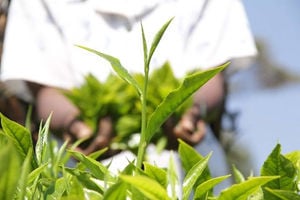
Workers pick tea leaves in a tea plantation.
The push by 17 satellite Kenya Tea Development Agency (KTDA) factories to be separated from their parent companies is bearing fruit for some, with the formation of a technical committee to midwife the process.
It has emerged that most of the factories that have not been granted independence are in the West of the Rift zone which covers Bomet, Kericho, Nyamira, Kisii, Nandi, and parts of Nakuru and Narok counties.
The farmers who are shareholders of the factories are seeking to have their accounts separated so that they can be paid monthly earnings for the supply of their green leaves, also known as the first payment, from the factories.
It will also lead to the payment of a second payment, popularly known as an annual bonus, to the tea growers in the KTDA-managed factories, which is calculated by the market performance of the tea produced by the factories.
As it stands now, farmers supplying their fresh produce are paid from one account – held by the parent company – for the annual bonus, which the farmers are now seeking to be separated.
“Separation of the factories, which we are pushing for, will come as a matter of formality as the CR 12 – bearing the list of directors and shares they hold in a company at the office of Registrar of companies – is different in all the factories,” Mr Simeon Mutai a KTDA zonal director said on Sunday.
Mr Mutai, who is in charge of the Tegat-Chemaner zone in Bomet county, clarified that even though the satellite factories operate under the parent unit, KTDA was the custodian of all assets, thus the need to grant what the farmers are demanding.
However, KTDA board members and top managers are said to have over the years frustrated the push for separation claiming it would lead to high overhead costs with individual factories forced to separately file tax returns, market the produce separately, and employ company secretaries among others.
KTDA manages 71 tea factories in 21 counties, out of which 54 are recognized as independent units, but with 17 running under their armpits as satellite units. A parent factory has under its wings an average of four satellite factories.
Kenya has an average of 680,000 small-scale tea growers supplying their green leaves to KTDA-managed factories while large-scale growers supply their crops to multinational firms while others sell it to private tea companies.
In what appears to be a case of light at the end of the tunnel, three factories in Bomet and Kericho counties have been given the green light by the government to run their financial affairs independently after a series of protests by farmers in the region.
Chelal and Toror tea factories have made strides in seeking to separate their accounts from the parent Litein and Tegat factories in Kericho county with the government giving the green light for the move to be implemented.
Motigo tea factory in Bomet county is the latest to get the green light to sever links financially with Kapkoros tea factory and sister companies – Tirgaga and Olenguruoene.
The resolution made on November 15, 2023, at the Annual General Meeting for Kapkoros group of companies held at Olenguruoene factory in Kuresoi South, Nakuru county, had not been implemented a year later leading to protests that have rocked the region.
The resolution was made under the factory expansion and modernization item, where it was agreed that there would be -“Separation of factories as per their rate of return”
Mr Benard Koech, the KTDA zonal director for the Mugango-Kiromwok zone said “the train has left the station in the push for the separation of accounts and there is no going back”
Mr Koech said farmers supplying their green leaves to the Motigo tea factory plucked high standards of green leaves compared to the other three factories, in which is confirmed by the fact that it fetches high prices in the market.
“We have formed a technical team to address the issues raised by the 17 factories so that on a case-by-case basis, we can assess and ensure it is merited and the process is seamless as we do not want to interrupt operations,” Dr Paul Ronoh, the Principal Secretary for Agriculture said.
Setting up of the committee followed a consultative meeting between the KTDA Chief Executive Officer Wilson Muthaura, KTDA board chairman Enos Njeru and officers from the Tea Board of Kenya (TBK) led by Chief Executive Officer Willy Mutai two weeks ago.
“After listening to the concerns raised by farmers in Bomet, we will give Motigo tea factory autonomy from Kapkoros as demanded by the shareholders in the past few weeks through a peaceful and consultative process” Dr Ronoh said on Thursday in Bomet.
Senate Majority Leader Aaron Cheruiyot has thrown his weight behind the demands by farmers to separate bonus payments from one factory to the other saying “it does not in any way undermine the founder shareholders rights not disinherit the mother factory of their investment”
“The clamour for by satellite factories for separation of bonus(second payment) calculation between the mother factory and the others is justified and founded on sound legal standing” Mr Cheruiyot who is the Kericho Senator, said.
Mr Cheruiyot said “I will fight for the rights and welfare of the tea farmers through legislation, pushing for competitive prices, advocating for sound leadership at the respective boards, allocation of resources prompt payment…. and accountability.”
In the Motigo factory, farmers boycotted the plucking of green leaves for a week demanding the separation of accounts, triggering action from the government.
It is estimated that more than 517,808 kilogrammes of green leaves went to waste in farms as a result of the protest that was called off after KTDA zonal directors went ahead and declared an annual bonus at Sh 20.1 per kilogram for the growers.
“The tea growers were demanding that the accounts for the factories be separated to enable each unit to tabulate and declare annual bonus individually and avoid conflicts in the units” Mr Richard Yegon, the Bomet East Member of Parliament said.
“The argument has been that whereas the farmers supplying their produce have maintained high standards in the plucking of green leaves – two leaves and a bud – the others have not adhered to the rules, thus lowering quality in production thus the low sales in the market,” Mr Yegon, a tea grower said.
Ainamoi MP Benjamin Langat led farmers and directors of the Toror tea factory in demanding separation from the Tegat tea factory in what he said would enhance competition in the production and marketing of tea.
Ms Lorna Koech, a director of the Chelal tea factory in Kericho county, said farmers in the region have for more than three years been pushing for separation from the Litein factory, but forces within KTDA allegedly pushed back on it.
“The time has come to operate independently as we are separate companies selling our tea independently, yet when it comes to bonus, we are forced to merge the accounts with Litein. This must stop as demanded by farmers who are shareholders of the company” Ms Koech said.
The prices the tea fetches at the auction and international market are based on the quality of production right from the farm to the factory. Produce from each factory fetched different prices in the market.
“Growing tea is an investment by the farmers who are seeking high returns from their produce. If one factory is not adhering to the plucking of two leaves and a bud, why should those strictly implementing the set standards be made to suffer low returns?” Ms Mercy Sigei, a farmer in Kuresoi South, wondered.
Ms Sigei said it had become clear to all that the low prices in the market were a result of non-adherence to plucking standards of green leaves on the farm, which the separation being pushed for sought to cure.
“The shareholders have the last word on their property, which they have contributed millions of shillings to construct, with deductions monthly for its operations. Why is it difficult to separate the accounts for purposes of bonus payment?” Ms Patrciah Lasoi, a farmer in Bomet East, wondered.
Some of the factories have claimed that the bonus payments were low because of a lack of adoption of quality production by sister companies, but the KTDA management has sought to reassure the farmers that all is well.
Mr Enos Njeru the KTDA chairman said in a statement on Friday that, “KTDA Management Services is an ISO-certified company and is bound to comply with these standards for the proper running of factory companies”
“The rate for the second payment is based on tea prices, tea volumes as well as the production and operation costs of each factory. These factors vary during the financial year and contribute to the second payment (bonus)” Mr Njeru stated.
“I wish to reassure stakeholders that the figures released by the factory companies are prepared in compliance with the International Accounting Standards (IAS) and International Financial Reporting Standards (IFRS) as governed by the Institute of Certified Public Accountants of Kenya (ICPAK),” he added.











